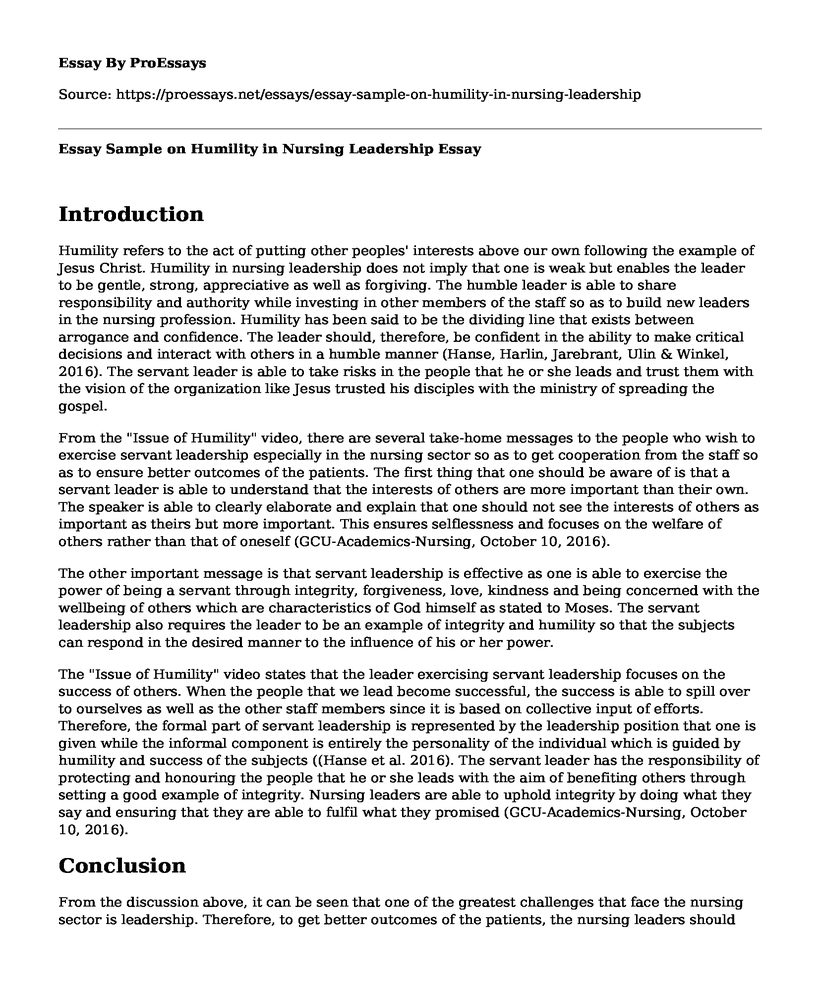Introduction
Humility refers to the act of putting other peoples' interests above our own following the example of Jesus Christ. Humility in nursing leadership does not imply that one is weak but enables the leader to be gentle, strong, appreciative as well as forgiving. The humble leader is able to share responsibility and authority while investing in other members of the staff so as to build new leaders in the nursing profession. Humility has been said to be the dividing line that exists between arrogance and confidence. The leader should, therefore, be confident in the ability to make critical decisions and interact with others in a humble manner (Hanse, Harlin, Jarebrant, Ulin & Winkel, 2016). The servant leader is able to take risks in the people that he or she leads and trust them with the vision of the organization like Jesus trusted his disciples with the ministry of spreading the gospel.
From the "Issue of Humility" video, there are several take-home messages to the people who wish to exercise servant leadership especially in the nursing sector so as to get cooperation from the staff so as to ensure better outcomes of the patients. The first thing that one should be aware of is that a servant leader is able to understand that the interests of others are more important than their own. The speaker is able to clearly elaborate and explain that one should not see the interests of others as important as theirs but more important. This ensures selflessness and focuses on the welfare of others rather than that of oneself (GCU-Academics-Nursing, October 10, 2016).
The other important message is that servant leadership is effective as one is able to exercise the power of being a servant through integrity, forgiveness, love, kindness and being concerned with the wellbeing of others which are characteristics of God himself as stated to Moses. The servant leadership also requires the leader to be an example of integrity and humility so that the subjects can respond in the desired manner to the influence of his or her power.
The "Issue of Humility" video states that the leader exercising servant leadership focuses on the success of others. When the people that we lead become successful, the success is able to spill over to ourselves as well as the other staff members since it is based on collective input of efforts. Therefore, the formal part of servant leadership is represented by the leadership position that one is given while the informal component is entirely the personality of the individual which is guided by humility and success of the subjects ((Hanse et al. 2016). The servant leader has the responsibility of protecting and honouring the people that he or she leads with the aim of benefiting others through setting a good example of integrity. Nursing leaders are able to uphold integrity by doing what they say and ensuring that they are able to fulfil what they promised (GCU-Academics-Nursing, October 10, 2016).
Conclusion
From the discussion above, it can be seen that one of the greatest challenges that face the nursing sector is leadership. Therefore, to get better outcomes of the patients, the nursing leaders should exercise the servant leadership style which advocates for protecting and honouring the subjects, integrity and humility, setting a good example and being focussed on the success of others. To be able to successfully implement the servant leadership style in the nursing profession, the leader should possess specific characteristics such as forgiveness, love, kindness and be concerned with the wellbeing of others such as Moses, Jesus and God himself did.
References
GCU-Academics-Nursing, (October 10, 2016). Servant Leadership. The Issue of Humility. Available Online YouTube: https://www.youtube.com/watch?list=PLqKj_eriTOI9Js2i_C2mitH1P96Zf6Q__&time_continue=5&v=ag84agXdkAE/ Accessed on 10 Jan. 19
Hanse, J. J., Harlin, U., Jarebrant, C., Ulin, K., & Winkel, J. (2016). The impact of servant leadership dimensions on leader-member exchange among health care professionals. Journal of nursing management, 24(2), 228-234.
Cite this page
Essay Sample on Humility in Nursing Leadership. (2022, Nov 19). Retrieved from https://proessays.net/essays/essay-sample-on-humility-in-nursing-leadership
If you are the original author of this essay and no longer wish to have it published on the ProEssays website, please click below to request its removal:
- Restraint Use Reduction and Instructional Methods
- Annotated Bibliography Example on Employee Wellness Programs
- The Feminism Management Theory and the Practice Management Theory Essay
- Catching the Interests of Physician Leadership Essay Example
- Paper Example on TechFite: Promoting Leadership & Community Involvement
- Essay Sample on Certification: Enhancing Nursing Faculty Career Growth & Quality Services
- Essay on Inclusive Education: Achieving Social & Academic Success for Children With Disabilities







